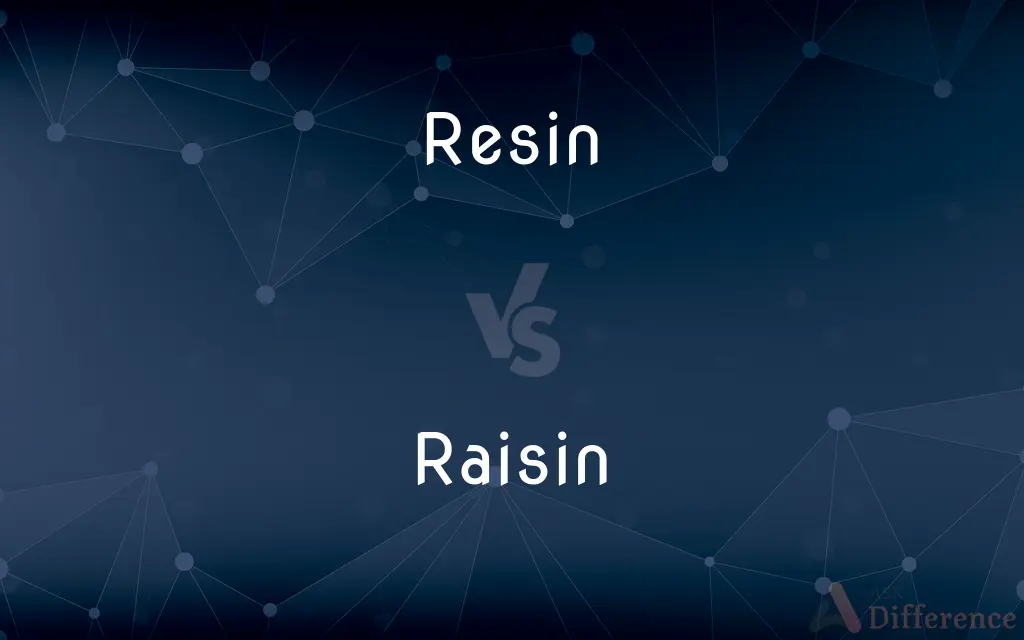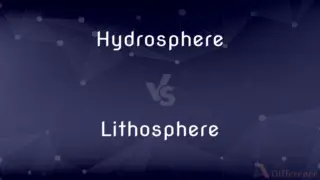Resin vs. Raisin — What's the Difference?
By Tayyaba Rehman — Updated on January 14, 2024
Resin is a sticky substance produced by plants or synthetically, used in various industrial applications, while a raisin is a dried grape commonly used as a food item.

Difference Between Resin and Raisin
Table of Contents
ADVERTISEMENT
Key Differences
Resin is a substance derived from plants or created synthetically, known for its adhesive and protective qualities. Raisins, on the other hand, are dried grapes, eaten as a snack or used in cooking and baking.
The use of resin spans various industries, including manufacturing, art, and construction, due to its durable and binding properties. Raisins are primarily used in culinary applications, often found in cereals, snacks, and desserts.
Natural resins are exuded from certain trees and are collected for processing, while synthetic resins are made from chemical compounds. Raisins are produced by drying grapes, either naturally in the sun or using dehydrators.
Resins can be hard and brittle or soft and sticky, depending on their composition and treatment. Raisins have a sweet taste and a chewy texture, varying slightly based on the type of grape and drying method.
In terms of handling, resins require careful usage due to their chemical properties and potential toxicity, whereas raisins are safe, edible items commonly found in households.
ADVERTISEMENT
Comparison Chart
Source
Plant-based or synthetic
Dried grapes
Use
Industrial, art, manufacturing
Culinary, as a food item
Properties
Adhesive, durable
Sweet, chewy
Production
Extracted from trees or chemically made
Drying of grapes
Handling
Requires safety precautions
Safe to eat
Compare with Definitions
Resin
Can be found in various forms, hard or soft.
The artist used a hard resin to sculpt the piece.
Raisin
A dried grape used as a food item.
I added raisins to the oatmeal cookies.
Resin
Requires careful handling due to chemical properties.
Always wear gloves when working with resin.
Raisin
Commonly used in baking and cooking.
Raisins add a sweet flavor to cinnamon rolls.
Resin
A sticky substance from plants or synthetic sources.
We used plant resin to create the varnish.
Raisin
Often eaten as a snack.
Raisins are a convenient and nutritious snack for kids.
Resin
Used in adhesives and coatings.
The table's surface was coated with a synthetic resin.
Raisin
Sweet and chewy in texture.
Raisins are a great addition to a healthy trail mix.
Resin
In polymer chemistry and materials science, resin is a solid or highly viscous substance of plant or synthetic origin that is typically convertible into polymers. Resins are usually mixtures of organic compounds.
Raisin
Can be made from various types of grapes.
Golden raisins are made from green grapes.
Resin
A sticky flammable organic substance, insoluble in water, exuded by some trees and other plants (notably fir and pine)
Clear resin had oozed to the surface, trickled down, and set
Raisin
A raisin is a dried grape. Raisins are produced in many regions of the world and may be eaten raw or used in cooking, baking, and brewing.
Resin
A solid or liquid synthetic organic polymer used as the basis of plastics, adhesives, varnishes, or other products
Epoxy resins frequently cause dermatitis
The chassis is constructed of synthetic resin
Raisin
A partially dried grape.
Resin
Rub or treat with resin
Resined canvas
Raisin
A sweet grape dried either in the sun or by artificial means.
Resin
Any of numerous clear to translucent yellow or brown, solid or semisolid, viscous substances of plant origin, such as copal, rosin, and amber, used principally in lacquers, varnishes, inks, adhesives, plastics, and pharmaceuticals. Resins are usually insoluble in water.
Raisin
A deep brownish purple.
Resin
Any of numerous physically similar polymerized synthetics or chemically modified natural resins including thermoplastic materials such as polyvinyl, polystyrene, and polyethylene and thermosetting materials such as polyesters, epoxies, and silicones that are used with fillers, stabilizers, pigments, and other components to form plastics.
Raisin
A dried grape.
Resin
To treat or rub with resin.
Raisin
(intransitive) Of grapes: to dry out; to become like raisins.
Resin
A viscous hydrocarbon secretion of many plants, particularly coniferous trees.
Raisin
A grape, or a bunch of grapes.
Resin
Any of various yellowish viscous liquids or soft solids of plant origin; used in lacquers, varnishes and many other applications; chemically they are mostly hydrocarbons, often polycyclic.
Raisin
A grape dried in the sun or by artificial heat.
Resin
Any synthetic compound of similar properties.
Raisin
Dried grape
Resin
(transitive) To apply resin to.
Resin
Any one of a class of yellowish brown solid inflammable substances, of vegetable origin, which are nonconductors of electricity, have a vitreous fracture, and are soluble in ether, alcohol, and essential oils, but not in water; specif., pine resin (see Rosin).
Resin
Any of various polymeric substance resembling the natural resins[1], prepared synthetically; - they are used, especially in particulate form, in research and industry for their property of specifically absorbing or adsorbing substances of particular types; they are especially useful in separation processes such as chromatography; as, an ion-exchange resin.
Resin
Any of a class of solid or semisolid viscous substances obtained either as exudations from certain plants or prepared by polymerization of simple molecules
Resin
Used in manufacturing and construction.
Resin is a key component in many industrial glues.
Common Curiosities
How are raisins different from other dried fruits?
Raisins are specifically dried grapes, while other dried fruits come from different fruits.
Can you eat resin?
No, resin is not edible and can be toxic if ingested.
Are all resins naturally derived?
No, resins can be either natural (from plants) or synthetic.
Is resin biodegradable?
Natural resins are biodegradable, but synthetic resins may not be.
Can resin be used in jewelry making?
Yes, resin is popular in jewelry making for encapsulating objects and creating glossy finishes.
Can resin be recycled?
Recycling resin depends on its type; some synthetic resins are recyclable.
Can raisins go bad?
Yes, raisins can spoil or become stale over time, especially if not stored properly.
Do raisins contain any vitamins or minerals?
Raisins are a good source of certain minerals like iron and potassium.
What are common uses of resin in art?
In art, resins are used for making varnishes, adhesives, and in some sculpting materials.
Are raisins used in savory dishes?
Yes, raisins can be used in savory dishes, often adding a sweet contrast.
Do different types of grapes produce different raisins?
Yes, the type of grape affects the flavor and color of the raisin.
Are raisins healthy to eat?
Raisins are healthy in moderation, as they are high in sugars.
Is resin harmful to the skin?
Some resins can irritate the skin, so it's advisable to use protective gloves when handling.
Are raisins suitable for vegans?
Yes, raisins are a plant-based food and suitable for vegans.
Is resin flammable?
Some resins, especially certain synthetic types, can be flammable.
Share Your Discovery

Previous Comparison
Cubic vs. Cubical
Next Comparison
Hydrosphere vs. LithosphereAuthor Spotlight
Written by
Tayyaba RehmanTayyaba Rehman is a distinguished writer, currently serving as a primary contributor to askdifference.com. As a researcher in semantics and etymology, Tayyaba's passion for the complexity of languages and their distinctions has found a perfect home on the platform. Tayyaba delves into the intricacies of language, distinguishing between commonly confused words and phrases, thereby providing clarity for readers worldwide.













































